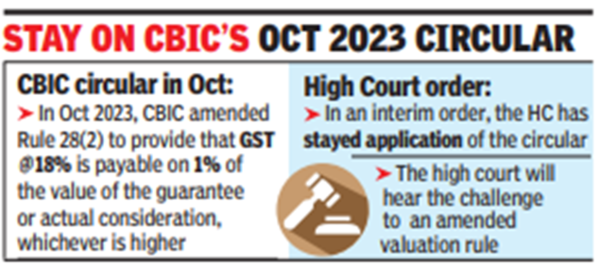- News
- Business News
- India Business News
- HC relief for holding companies facing GST notices over corporate guarantees
Trending
HC relief for holding companies facing GST notices over corporate guarantees

Representative Image
MUMBAI: In a relief for India Inc, the Punjab & Haryana high court has stayed a circular that subjected corporate guarantees, given by holding companies for the benefit of their subsidiaries, to GST.
In an interim order, the HC has stayed the circular issued last Oct by the Central Board of Indirect Taxes and Customs (CBIC). This circular had held that a corporate guarantee given by a holding company to a bank or financial institution for sanction of credit facilities to its subsidiary would be a 'supply of service' subject to GST.
It had added that the tax incidence would arise even if no consideration is involved. The matter, pending before the high court, includes a challenge to valuation of corporate guarantees as well.

Demands have been raised on the holding company, if it is in India. If the holding company is overseas, the Indian subsidiary (for whose benefit the corporate guarantee is given) is facing GST demands.
Industry representatives told TOI that after the circular, the issue of showcause notices, followed by demands, intensified. Industries across all sectors, ranging from FMCG to infrastructure, received such notices.
"The interim order, which has granted a stay, will apply pan-India. The circular, which stated that corporate guarantee was a supply of service, led to a foregone conclusion on part of tax officials, that every corporate guarantee transaction (other than personal guarantee by a director) was subject to GST, without the same being tested on merits," said Mannat Waraich, who represented Acme Cleantech Solutions in this matter before the HC.
She added, "If a company has received a showcause notice, which is based on the circular, it should immediately approach the jurisdictional high court for quashing the same. If an order raising a demand has been issued, the company should approach the appellate authority or the high court seeking to quash it. It would be up to the quasi-judicial authorities/courts to quash the demand or keep it in abeyance."
Sujit Ghosh, senior advocate, Supreme Court, who led the arguments for the company, said, “This interim order essentially seeks to enforce that we have a fundamental separation of power (under our constitutional construct) between the executive and the judicial wing of governance. The executive wing being the tax administrator (i.e. CBIC) in this case cannot fetter with the adjudicatory and appellate powers of the quasi-judicial authorities.”
Waraich added, “We have also challenged Rule 28(2) of the CGST Rules (amended) which provides that GST at 18% will be payable on 1% of the value of the guarantee or the actual consideration, whichever is higher. These rules have also been challenged as being arbitrary, discriminatory, and confiscatory in nature.”
In an interim order, the HC has stayed the circular issued last Oct by the Central Board of Indirect Taxes and Customs (CBIC). This circular had held that a corporate guarantee given by a holding company to a bank or financial institution for sanction of credit facilities to its subsidiary would be a 'supply of service' subject to GST.
It had added that the tax incidence would arise even if no consideration is involved. The matter, pending before the high court, includes a challenge to valuation of corporate guarantees as well.

With this stay, for now, India Inc - which is reeling under showcause notices and GST demand orders running into several hundred crores - can breathe easy. Companies that have received showcause notices based on this circular can approach an HC for quashing the same.
Demands have been raised on the holding company, if it is in India. If the holding company is overseas, the Indian subsidiary (for whose benefit the corporate guarantee is given) is facing GST demands.
Industry representatives told TOI that after the circular, the issue of showcause notices, followed by demands, intensified. Industries across all sectors, ranging from FMCG to infrastructure, received such notices.
"The interim order, which has granted a stay, will apply pan-India. The circular, which stated that corporate guarantee was a supply of service, led to a foregone conclusion on part of tax officials, that every corporate guarantee transaction (other than personal guarantee by a director) was subject to GST, without the same being tested on merits," said Mannat Waraich, who represented Acme Cleantech Solutions in this matter before the HC.
She added, "If a company has received a showcause notice, which is based on the circular, it should immediately approach the jurisdictional high court for quashing the same. If an order raising a demand has been issued, the company should approach the appellate authority or the high court seeking to quash it. It would be up to the quasi-judicial authorities/courts to quash the demand or keep it in abeyance."
Sujit Ghosh, senior advocate, Supreme Court, who led the arguments for the company, said, “This interim order essentially seeks to enforce that we have a fundamental separation of power (under our constitutional construct) between the executive and the judicial wing of governance. The executive wing being the tax administrator (i.e. CBIC) in this case cannot fetter with the adjudicatory and appellate powers of the quasi-judicial authorities.”
Waraich added, “We have also challenged Rule 28(2) of the CGST Rules (amended) which provides that GST at 18% will be payable on 1% of the value of the guarantee or the actual consideration, whichever is higher. These rules have also been challenged as being arbitrary, discriminatory, and confiscatory in nature.”
End of Article
FOLLOW US ON SOCIAL MEDIA















